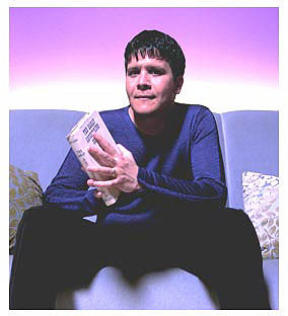Many of us living in todays fast-paced new economy find ourselves scanning hundreds of pages of information daily while enduring a constant flow of interruptions from cell phones, palms, pocket pcs, instant messaging and pagers.
Some of us even e-mail the person in the cubicle next to us instead of walking five feet to ask a question. Were part of the always-on economy.
Tim Sanders knows this all too well as Yahoos chief solutions officer, author of Love is the Killer Ap and coiner of such terms as Lovecat and NEDS (new economy depression syndrome). New study findings link heavy Internet usage, information overload and social isolation to NEDS a sort of carpel tunnel of the mind. Sanders took a moment between interviews on ABCs PrimeTime Live and CNNs Lou Dobbs Moneyline to talk about NEDS symptoms and cure.
Q: Whats up with this NEDS?
Sanders: NEDS is an acronym for new economy depression syndrome. Its a mental state that a result of a combination of information overload and frequent interruption resulting in and erosion of personal close relationships. The symptoms are anxiety, fatigue, stress and lower productivity and irritability in a team environment.
Q: The online piece of our business and personal life is only getting more substantial. What you telling people who are involved in the online world of the massive way how to adapt?
Sanders: What weve noticed is that the survey respondents have strong personal relationships at work in homes suffer less symptoms despite being attacked by the same amount of information. The number one solution is resiliency through warm living. That means a certain amount of face-to-face contact, phone contact on long-term e-mail relationships and living in the warm channels, contributing warm thoughts and ideas. Those create shock absorbers that can help you deal with this information.
Personally, if I turned everything off, I would be a very effective chief solutions officer at Yahoo. If I didnt check my e-mail, carry a Blackberry or pager, it would be very difficult for me to maintain execution focus. Unfortunately, Im still pummeled every day by information. But Im buffering with strong business relationships, strong warm-hearted thinking patterns. Im creating tech-free zones throughout my day.
Q: Youre suggesting more of a balance in how you use technology and live your everyday life.
Sanders: I actually like to think of it is a high-tech diet. Think about it this way: When the health craze was going on, everybody was going to be physically fit. They said, Dont take the elevator. Take the stairs. So I say, Dont send an instant message 15 feet. Get up! Walk 15 feet. See someones face. Theyll transfer physiological energy to you face-to-face. Its just a different way of behaving. If you and I went back and forth twice with e-mail that it! Im right to call you rather than e-mail reply. Thats a habit.
I think you have to be conscious about it. Thats why theres a motto across my cubicle that says In a world of inforuption, love is a killer app.
Q: Is dealing with technology a generational thing?
Sanders: The older you are, the harder it is to withstand stress. The reason why is a concept I call digital natives versus digital immigrants. My teenager has been online since he was 6. Over 80 percent of his life has been online. Hes a native. Thats his natural environment. In my 40s, I dont think Ive been online 20 percent of my life. As a result, thats all new to me. Thats what stress is. Stress is literally something I cannot control, withstand – its new. Novelty creates stress. As a result, these businesspeople that are in their 40s and 50s this is so new to us. We are drinking out of a fire hose. Its amazing. You take a 50-year-old CEO and in one year, not only does he now check e-mail, he is armed with a belt CrackBerry pager and is available 24/7. His grandfather only worked 25 hours a week. Now the CEO is always on. Its very difficult to adjust to that and it leads to a lot of additional stress for the older working population.
Q: Ive known some IT guys that work really hard but really cut themselves off from human interaction, turning from geeks and nerds to something worse.
Sanders: Its a downward spiral. People began to create walls. You start leaving voicemail messages that say Dont leave a message. E-mail me.
They build a wall around them. They start displacing strong, yet vulnerable relationships with friends with weak and risk-free relationships with online buddies. Its easy to delete something. Its difficult to have a real confrontation over instant message. This is especially true with men. Our survey research found you were much more likely to be a man than a woman and have NEDS.
Q: Can you give me an example?
Sanders: One of the pieces of advice I always give managers is you havent seen the face of your employee in a quarter, thats alarming. If you havent heard their voice for you allow them to work in a secluded environment where all they do is type and read all day, its a problem. I would tell managers they need to break the cycle. Itemize one thing that you admire about them, either personally or professionally, and physically approach them, sit next to them and tell them why you are glad they came into your life. Youll help create the energy transfer and you may very well reverse the trend in an individual.
About two weeks ago I received an e-mail from a manager of the software company. He had six engineers. He said he had seen their faces an almost a year. Thats just how they work. Theyre all the same floor, on the same wing business faster to them to work completely on instant messaging. He told me he was going to follow my advice.
When he followed up with me, he said, Youre not going to believe this. One of my software engineers Lenny just bought me and an X-box system as a gift. When I asked him where he got the money to buy that system, he said he sold his chrome 9 mm.
When youre a boss and you hear something like that, you tend to pay a lot of attention. He said, What do you mean?
Lenny said, When I moved here to Seattle a few years ago my mom just died. She was my only friend in the world. So I went to work here. I work about 60 hours a week in a cubicle. I got really depressed.I got so depressed one day I went down to a pawn shop and bought a beautiful 9 mm and some bullets. It took me about three months to actually get the first bullet in the gun.It took me another six months to actually lift the gun up and put it to my head. I was getting closer and closer.
Then last week you really freaked me out. You came into my cubicle. You put your arm around me. You told me that you value me because I finish everything early and you sleep better at night.You said you are glad I came into your life.
When I went home that night, I went through all the same things Ive been doing for months, but when I opened the box and saw the gun for the first time it scared me to death. So the next morning I sold it, got $200 for it, didnt know what to do with the money. I knew you always wanted an X-box. This is my gift to you. Dude thanks.
Theres a lot of those people out there more than you know.
If anyone has a story like this to contribute, send an e-mail to tim@timsanders.com. I know doing that increases my chance of getting NEDS, but I consider myself a sacrificial evangelist.
For information on NEDS and more conversation with Tim Sanders, the full audio interview is available starting Saturday at WebTalkGuys.com. The NEDS website is at www.GotNeds.com. You can purchase his book Love is the Killer Ap at www.TimSanders.com.
Dana Greenlee is co-host, producer and engineer of the WebTalkGuys Radio Show, a Tacoma-based radio and Webcast show featuring technology news and interviews.







